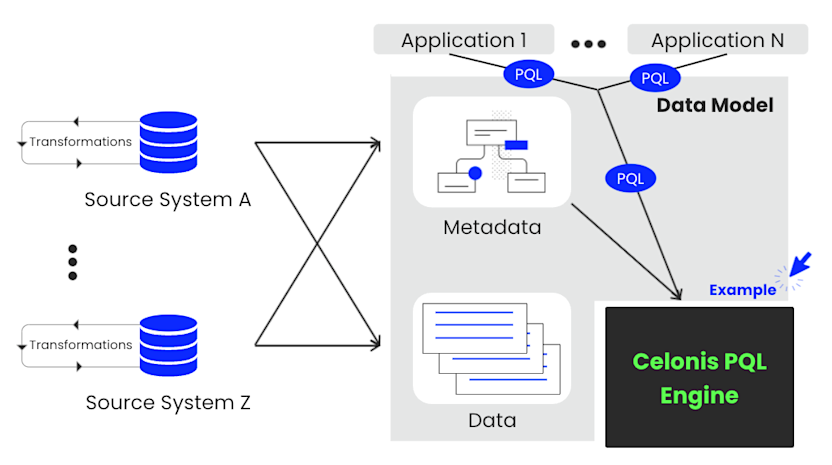
Learn PQL with these free online courses from Celonis Academy
Even as Celonis makes is making it easier for everyone in the organization to access the benefits of process intelligence and process mining, with innovations like Process Copilots, understanding and being able to effectively use the Celonis Process Query Language, also called Celonis PQL, cab be a valuable skill. Celonis Academy offers free, online PQL courses that will help both processing mining beginners and experts get up to speed with this custom-built query language.
What is PQL?
PQL is a domain-specific, programming language designed to help business users analyze processes by running process-related queries on a custom-built query engine, the Celonis PQL Engine (a column-store main memory database system).
PQL is a declarative language and was originally released in 2014 as an extension to SQL (Structured Query Language). In this first PQL version, the custom PQL commands were translated into standard SQL and executed on the source database system. In 2016, Celonis PQL was released as a completely independent language, inspired by SQL, with queries being executed on the Celonis PQL Engine. Because the PQL Engine was optimized for process mining, this change improved run time performance and made it easier to support more source systems.
As of today, PQL queries are executed on Celonis' Premium Process Query Engine, which can process up to 4X more data and provides processing speeds that are 3X faster than previously possible. Over 10,000 users conduct more than 5 million queries per day on the Celonis Process Intelligence Platform.
Free PQL training courses from Celonis Academy
Celonis training is available at our Academy, which offers both individual courses and Training Tracks (guided learning paths that consist of multiple courses). Learners can complete a course or track in a single session or break up the learnings over time. The following courses and tracks can help you master both PQL basics and advanced techniques.
Write PQL Queries (training track)
The Write PQL Queries training track replaces the previous training track called "Build Analyses - Advanced". It consists of 2 sections, 5 required courses and 1 elective course. It's the perfect place to get started with PQL and learn advanced techniques.
Introduction to PQL and the Celonis PQL Engine
Start your Celonis PQL journey here. This course covers the history and core design goals for PQL as well as the Celonis Software Architecture and PQL Engine. You will also learn how to differentiate between SQL and PQL statements and apply the main PQL operators. The course takes about 20 minutes to complete.

The Celonis Software Architecture: Celonis applications use Celonis PQL to query data from a data model.
Create your first PQL Queries
Designed to help learners start writing PQL code, this course teaches them to Write their first PQL queries and do small adjustments on existing queries. It is designed to take about 15 minutes to complete.
Basic Coding with PQL
This course will teach you how to code basic queries with PQL. After completing this course, learners should be able to apply basic Celonis PQL queries containing conditions and basic functions, modify string input and timestamps and use basic process-related functions. PQL best practices and library sources are also covered. The course is available in English, German, French and Japanese. It is designed to take about 2.5 hours.
Joins and Filters in PQL
This course starts with a deep dive into Data Models with multiple tables, relationships between tables and joins. It will also show you how to find the Data Model visualization in Celonis Process Analytics and Studio. Next, it covers the execution order of joins and aggregations and teaches you how to handle the error “No common table”. Lastly, learners will explore the concept of filters, discussing basic filters on a single table as well as filter propagation to multiple tables. It is recommended that learners take Basic Coding with PQL or have a solid understanding of PQL basics before taking this course. A basic understanding of relational databases and completing the PQL and the Celonis PQL Engine course would also be beneficial but are not a must. The course is designed to take about 45 minutes.
Use PU-Functions for Aggregations
This course will help learners take their formulas to the next level by using PQL's Pull Up (PU) - functions. After completing this course, you will be able to apply PU functions instead of standard aggregation where necessary, understand underlying table structure and filter behavior, act on error messages like “no common table” and “PU-function could not be executed” and apply correct syntax. It is highly recommended that learners complete both Basic Coding with PQL and Joins & Filters in PQL before taking this course. The lesson is designed to take about 1 hour. This course was previous called "Use PU-Functions in Analyses."
Use Domain Tables in PU-Functions
This course teaches learners to use a PU-function with the same table. After completing this course, they should be able to apply the DOMAIN_TABLE function, explain the relationship between the DOMAIN_TABLE function and the PU-function, describe how Domain Tables are joined to the Data Model Tables and recognize when the DOMAIN_TABLE function should be used.
Learn PQL, process mining and execution management skills
Data-centric employees (data scientists, data engineers, strategy managers, etc.) with process mining, process management, or execution management skills are in demand. But if you’re stretched for time, check out our PQL micro-learning courses for short and snappy bite-sized training.
For more information on Celonis Academy and the free, on-demand training courses and learning material available from Celonis, check out the following resources:
Top online training courses for business and tech professionals from Celonis Academy
These Celonis Digital Badges could be among the hottest new credentials for tech pros
Process Mining: From Theory to Execution (free 10-hour, on-demand course developed by Celonis and the Process and Data Science (PADS) group)
What is Task Mining? (free 4-min video introduction to task mining)
Celopeers job market message board
Updated April 20, 2023 to reflect updates to several courses and training tracks.



